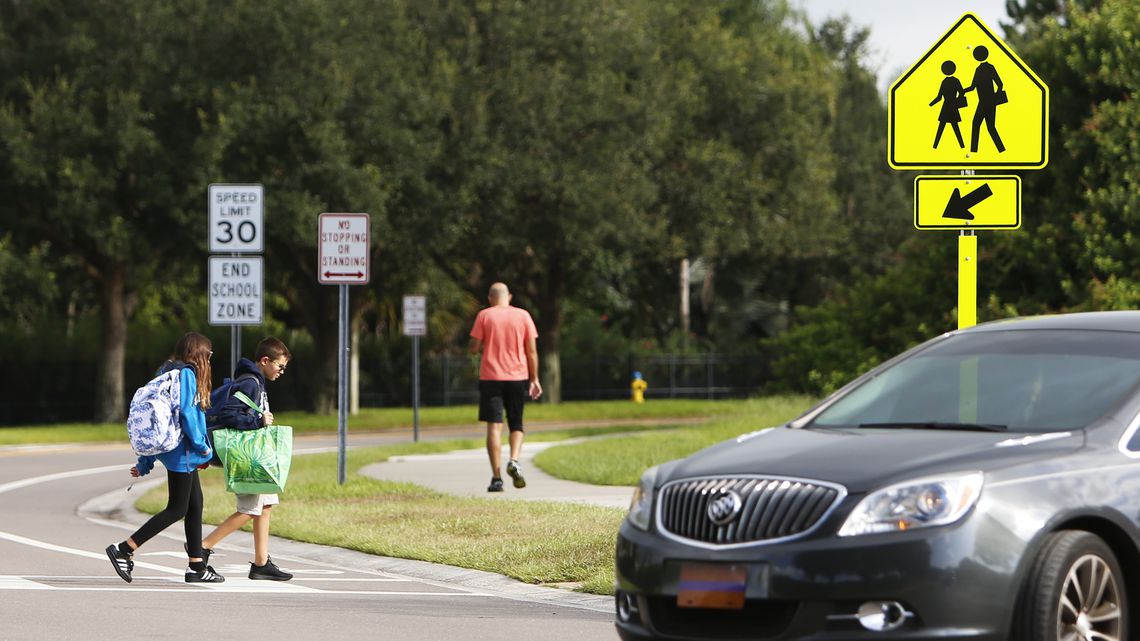
Florida may allow school-zone cameras. They work like red-light cameras
A state Senate committee advanced a bill that would pave the way for school districts to install the speed detection devices. The fine would be $158.
Tampa Bay Times | By Anastasia Dawson | January 27, 2022
Speeders beware.
A bill that would allow Florida school districts to install speed detection cameras in school zones is one step closer to becoming law after breezing through its second state Senate subcommittee hearing Wednesday with unanimous support.
Should the bipartisan bill (SB 410) get the green light from state lawmakers, counties and municipalities across the state could begin installing the cameras in and around school zones by this summer.
Drivers caught on camera traveling 10 mph or more over the limit in an active school zone would face a $158 fine under the law. The cameras would stay rolling throughout the school day, starting an hour before classes begin until an hour after classes end.
“Hundreds of thousands of Florida’s students cross roadways on their way to and from school, and nowhere in America are they in more danger from cars than in our state,” Sen. Ana Maria Rodriguez, R-Doral, said during the hearing. “This legislation gives communities a simple, effective and inexpensive way to protect our students.”
The Senate bill must pass through one more committee hearing before it goes to the floor for a final vote. Then, the House version must work its way through four more committees and a floor vote before it can be sent to Gov. Ron DeSantis.
Should the bill be signed into law, there would be a 30-day “education period” to inform the public before it goes into effect.
This is the second year that Rodriguez and Rep. Nick Duran, D-Miami, have presented the proposal to fellow lawmakers. Last year, the bill died in the Senate as questions were raised about distributing money generated by the speeding tickets and whether the state needs to introduce more automated cameras on roadways.
At Wednesday’s hearing, senators were united in their support.
“I think it’s on us to protect our children, and I think many of us don’t realize the number of kids that have to walk to and from school,” said Sen. Janet Cruz, D-Tampa.
The speed cameras would work much like red light cameras, Rodriguez said. The registered owner of any vehicle captured on camera would receive a speeding ticket in the mail within 30 days of the offense, without ever interacting with an officer.
The bill’s language does provide some leeway for offenders, stipulating a free “warning” for a first offense. After that, though, fines increase with the driver’s speed, going up to $500 for driving 30 mph or more above the limit.
Those ticketed would have the right to review, in person or remotely, all “electronic images or streaming video and evidence of the speed of the vehicle as measured by a speed detection system.” Those cited can also request a hearing.
In the bill’s current form, proceeds from each $158 ticket would go to the state Department of Revenue, the local county or municipality and the school district where the violation occurred. All the money is intended to be used for school transportation and safety initiatives.
It would be up to school districts and local governments to purchase the cameras from their own budgets, Rodriguez said. But after a few years, the cameras should pay for themselves with ticket revenue.
Schools throughout the state have already added safety measures for students on the move. But crossing guards, school resource officers, parent volunteers and flashing beacons haven’t proved to be effective deterrents to speeders, Rodriguez said.
A 2018 study by Zendrive, a company that analyzes transportation data, named Florida the second-most dangerous state when it comes to driving in school zones. Twenty Florida counties, both rural and urban, were given F grades for driving behavior in school safety zones.
The same study ranked Hillsborough, Pinellas and Sarasota counties in the top 15 most dangerous among Florida’s 67 counties. Hillsborough County rated the worst among the local counties at 60.
These findings were echoed in the most recent report from the Florida Sheriff’s Association showing that in 2019, law enforcement ticketed 2,819 drivers and gave warnings to 4,040 more during the annual week-long “Operation School Zone Safety” campaign.
Joining Rodriguez at Wednesday’s hearing were supporters from the Florida PTA, Florida Bicycle Association and the Florida Police Chiefs Association. Also attending was Melissa Wandall, a Bradenton mother who became an advocate for traffic safety after her husband was killed by a distracted driver in 2003.
“Here we have the choice to end a life or to save a life,” Wandall told lawmakers. “Unfortunately, good people forget what’s at stake when they don’t follow these safety laws. Good people make bad choices, but we can help them be better. Let’s help them curb these behaviors.”





